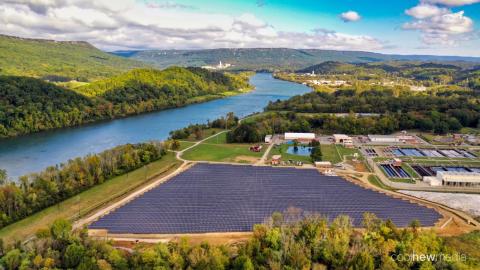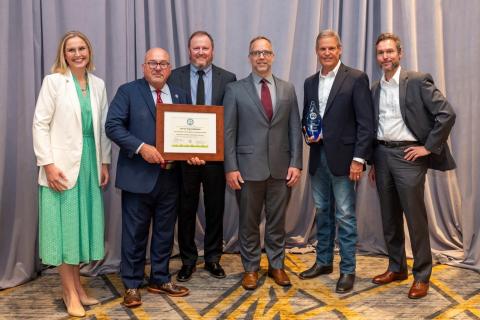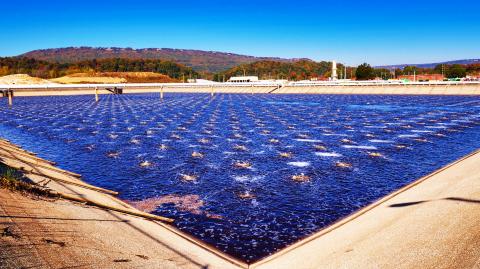-

City of Chattanooga’s Moccasin Environmental Campus, Solar Array (courtesy of the City of Chattanooga)
-

From left to right: Sarah Robbins, City of Chattanooga; David Salyers, TDEC Commissioner; Erik Schmidt, City of Chattanooga; Mark Heinzer, City of Chattanooga; Bill Lee, Governor of Tennessee; Xavier Pedeux, Jacobs
-

City of Chattanooga's equilization basin
The City of Chattanooga Wastewater Department operates a large regional wastewater treatment system that covers 500 square miles of service area, serving approximately 400,000 people across five counties in two states. The system has the capacity to convey and treat up to 230 million gallons of wastewater per day.
In 2012, the City of Chattanooga, Tennessee entered a negotiated Consent Decree with the U.S. Environmental Protection Agency. To ensure compliance, the city selected Jacobs in 2013 to provide program management services for an ambitious 17-year, $1.1 billion EPA-driven Consent Decree (CD) wet weather capital improvements program, called Clear Chattanooga. Jacobs performed the pre-CD program work, successfully negotiating the provisions of the CD program in a less prescriptive, more performance-based, two-phase, holistic approach.
Since this time, the City of Chattanooga has increasingly trusted our global expertise to become an extension of the city’s wastewater collection and treatment system. We’ve worked diligently to reduce the volume of Sanitary Sewer Overflows (SSOs) by 90%, removing inflow and infiltration by relining 1.7 million feet of pipe, and increasing capacity and resiliency across the sewer system. The CD Program is currently in year 12 and is set to be completed in 2030.
Jacobs’ deep domain knowledge across the program's lifecycle including scope, schedule, and budgets, provides a unique view on the city's entire treatment and collection system while minimizing new infrastructure and reducing the burden on the communities the city serves.
Industry-recognized energy efficiency
Throughout the program, Chattanooga’s Wastewater Treatment Plant has been recognized by numerous local, state and federal officials, organizations, and agencies for improvements in energy, treatment, collections, water quality and operations.
Implementing energy-efficiency measures for this program have been a focus of Jacobs and the city for quite some time. For example, in 2015, the city joined the U.S. Department of Energy (DOE) Better Building Challenge, committing to reduce energy intensity by 20% in ten Years. After reaching this goal five years ahead of schedule in 2019, Chattanooga has since achieved 36% (18 GWh) energy intensity savings across 2 million ft2 of building space from a 2013 baseline. In December 2022, the DOE recognized the city for its energy efficiency leadership.
Chattanooga’s Moccasin Bend Environmental Campus (MBEC) is the largest energy consumer of the city’s owned and operated buildings. To holistically improve the MBEC’s efficiency and performance, Jacobs designed and installed a 10-acre solar array that saves 10% of the plant energy and produced 14 GWh since 2021 and is now upgrading the plant equalization basins with more efficient aeration that should save an additional 15% in energy. The city also retrofitted the building with LED lighting, improved water systems and installed variable frequency drive controls. This holistic approach has resulted in 27% energy and 24% water savings annually at the campus, ultimately saving $1.4 million per year while maintaining optimal CD compliance.
To further support the city’s leadership in energy efficiency, Jacobs completed the Clear Chattanooga Energy Audit in 2023 to identify additional opportunities to move toward a net-zero energy campus. As a direct result of this audit, the city is in the process of implementing a $150 million project to generate green energy by enhancing the sludge anaerobic digestion using Thermal Hydrolysis Process (THP) and replacing the Pure Oxygen plant by an efficient subsurface aeration system in the activated sludge basins. The project will make a significant contribution to the city’s Climate Action Plan and to Jacobs’ overall commitment to drive climate mitigation measures. Climate change is one of our planet’s greatest threats, challenges and opportunities. With this sense of urgency, Jacobs has elevated Climate Response as one of three core accelerators within our company strategy.
Did you know?
-
400 K
people are served by the The City of Chattanooga Wastewater Department
-
18 GWh
energy intensity savings to date from the program's energy-efficiency measures
-
24 %
reduction in water use achieved across the program
-
$ 1.4 M
savings in energy costs delivered by the program every year
Because of these consistent, holistic efforts, in December 2023 the city was awarded the 2023 Governor’s Environmental Stewardship Award for Excellence in Energy and Renewable Resources.
“I was honored to represent Jacobs and receive the Governor’s Environmental Stewardship Award with the city," says Jacobs Program Manager Xavier Pedeux. "Our projects make a great contribution to the city’s Climate Action Plan and fully support Jacobs’ climate response strategic growth accelerator.”
"Jacobs continues to be an integral partner in helping the City of Chattanooga and the Moccasin Bend Environmental Campus simultaneously achieve both our operational performance goals and our sustainability and resilience goals," says Director of Sustainability, City of Chattanooga Department of City Planning Erik Schmidt. "Projects like the equalization basin reconfiguration have the ability to reduce campus energy demand by double-digit percentages while also providing the secondary and important benefit of increasing wet weather storage on our system. In the face of recurring and increasingly common severe weather events, right-sizing our energy demands while adding 4 megawatts of on-site solar generation capacity not only increases our resilience, but the shared resilience of the local power grid. With more projects yet to come, Moccasin Bend and Jacobs will continue to set the bar for what is possible as we strive for a carbon-neutral future."












































